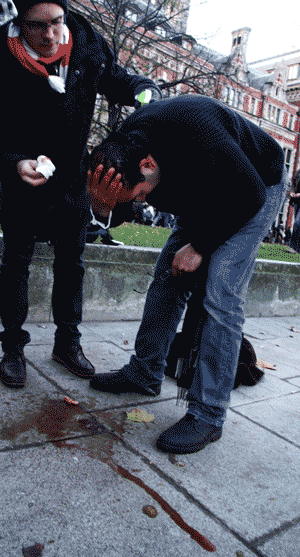Journalist Shiv Malik was injured by a police baton strike during last week’s student protests. He asks who should be blamed for the violence: protesters, police officers or politicians?

It wasn’t true. At 15:30pm, two hours after it began, the front of Thursday’s anti-fees march had not been kettled. It was hemmed in on four sides of the square, but a main exit was still open — up Whitehall, the actual route of the march. The thing was, no one wanted to leave. “ We saw what happened after a million people marched during the Iraq war. We don’t want to just go home. And they haven’t even voted yet,” one red haired female college student told me.
Asserting their right to free movement, the crowd surged up Victoria which was blocked by a line of riot and mounted police. Within a few minutes, I found myself at the front line.
“Get back, get back,” shouted a six-foot copper, his truncheon raised. Now with the crowd pressing up behind me, attempting to break the line, there was nowhere to go. The officer’s baton then glanced the side of my face, knocking off my glasses and catching my left eye. I caught my glasses before they dropped to the floor and then prepared for a second strike. This time, I held the officer’s baton for a few seconds as it came down on me.
It was a natural response — I was defending myself against assault. However, an officer trying to keep order is a licensed professional in a unique position: they are permitted to strike out — within reason — to keep the peace and hold their line. For the officer, protecting myself by placing a hand around his baton, even for a moment, riled him up no end; I was stopping him from doing his job. The third strike caught the top of my head. The blood began to pour.
The narrative of who started what and when, and the blame game of who is responsible for violence — protesters or the police — is most always chewed over by people who don’t actually go to demonstrations where there is a threat of public disorder. As someone who has attended dozens of violent protests over the last ten years, including all four major student demos since 10 November, I can say that most trouble starts when protesters try to move in a direction — up a street or down an alley — which police commanders have decided they must be barred from.
Thursday’s events left hundreds of students and police injured. It was pure chance that no one died.
It’s worth asking a counter factual question. What would have happened if the police hadn’t been there, stacked line-by-line near Parliament? The answer, I believe, is that the students would have entered the House of Commons and occupied it. And it is entirely possible that it would have been 99 per cent peaceful, rather like the countrywide protests of 30 November or the dozens of other student occupations around the country. Ultimately, the police were there to protect the Palace of Westminster from a very unpopular decision being taken against people who couldn’t vote at the last election or felt rightly betrayed by the party they did vote for. And the easiest way you can stop thousands of people from occupying a building is to beat them back or charge at them with horses. Protesters will obviously fight back and use violence in turn.
One protester here sums this up: “A feeling of desperation always leads to severe consequences. The problem is the government are not supposed to allow it to go that far. They have, they’ve pushed their luck and now they are happy to hide behind the police, who aren’t our enemy, yet they’re the ones who get the stick for it. They brutalise us, we fight back, but it deters from the fact that the enemy is in there,” he says pointing towards the Palace of Westminster.
The police know this too. Asked if repeated clashes with students could damage the police’s reputation, Association of Chief Police Officer president Sir Hugh Orde said, “Yes, if it is allowed to be played as the cops acting as an arm of the state, delivering the elected government’s will, rather than protecting the rights of the citizen.”
He added “the predictable consequence” of the anti-cuts demos were that “the police become the focus of people’s anger. Any time citizens in uniform comes up against the citizen, relationships suffer.”
Orde is absolutely right, we are all citizens. So ultimately it is those politicians who cower behind the uniforms and resources of some of those citizens, who are responsible for the violence. And they should only carry on if they have the stomach for more blood.
Shiv Malik is a journalist and co-author of Jilted Generation: How Britain Has Bankrupted Its Youth




